It’s Oscar weekend–and video store shelves are well-stocked with new releases celebrating present nominees and past winners.
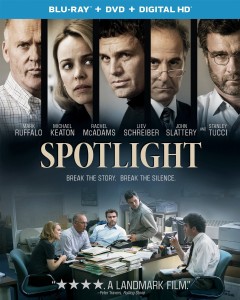 As of tomorrow night, the outstanding Spotlight will be in the winner’s circle–for something. Best Picture, to go along with its Independent Spirit Awards? For selfish reasons, I hope not, though I’ll hardly be put out if it goes the distance. This is one of the great newspaper movies, a genre that writes its own extinction daily, and a great rabble-rousing movie, period, that never once shouts or raises its voice. Like its journalist heroes, it does the work, painstakingly, deliberately, as Tom McCarthy’s muckraker lucidly exposes sex scandals within the Catholic church in Boston, which set off worldwide investigations that continue to this day. You can smell the newsprint on the entire rich ensemble cast–if I had to pick a favorite, it would be Liev Schreiber’s Globe editor Marty Baron, who greets his leery staff with the most unenthusiastic “I’m delighted to be here” ever heard on film. He’s Jewish, and ignorant of baseball, a complete outsider to an industry town for the church and the Red Sox. What he’s saying is: That’s the last nicety you’ll get from me. You don’t know me, and I don’t know you. But I respect what you’re trying to do. Let’s get more done. The movie’s tone is set right there. And we’re off, snaking through reams of bureaucracy and coverups and dead ends, exposing a terrible truth with suspense, a certain workaday humor, empathy, and a streak of righteous anger that never overwhelms the procedural. I was delighted to be there.
As of tomorrow night, the outstanding Spotlight will be in the winner’s circle–for something. Best Picture, to go along with its Independent Spirit Awards? For selfish reasons, I hope not, though I’ll hardly be put out if it goes the distance. This is one of the great newspaper movies, a genre that writes its own extinction daily, and a great rabble-rousing movie, period, that never once shouts or raises its voice. Like its journalist heroes, it does the work, painstakingly, deliberately, as Tom McCarthy’s muckraker lucidly exposes sex scandals within the Catholic church in Boston, which set off worldwide investigations that continue to this day. You can smell the newsprint on the entire rich ensemble cast–if I had to pick a favorite, it would be Liev Schreiber’s Globe editor Marty Baron, who greets his leery staff with the most unenthusiastic “I’m delighted to be here” ever heard on film. He’s Jewish, and ignorant of baseball, a complete outsider to an industry town for the church and the Red Sox. What he’s saying is: That’s the last nicety you’ll get from me. You don’t know me, and I don’t know you. But I respect what you’re trying to do. Let’s get more done. The movie’s tone is set right there. And we’re off, snaking through reams of bureaucracy and coverups and dead ends, exposing a terrible truth with suspense, a certain workaday humor, empathy, and a streak of righteous anger that never overwhelms the procedural. I was delighted to be there.
The Blu-ray offers a perfectly respectable transfer, nothing fancy. Not too much, though, in the way of supplements–just three short, clip-heavy featurettes, one a roundtable with the actual, Pulitzer Prize-winning “Spotlight” team. The film does them proud.
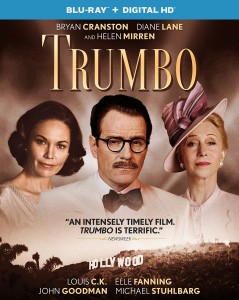 Like The Big Short, Trumbo benefits from having a seasoned comedy director (Jay Roach, of the Austin Powers and Meet the Parents movies) at the helm, to lighten the load. And Oscar nominee Bryan Cranston is persuasive as screenwriter Dalton Trumbo, who, thrown under the bus with his colleagues during the Hollywood blacklist period, figured out a way to literally write their way out of their predicament, with the help of a shady producer (John Goodman, in full, funny bluster mode). As one of those year-end, Oscar-baiting “movies about movies” that constitute a new genre, it’s pretty lively. But it also cuts way too many corners. Edward G. Robinson and John Wayne, still familiar to viewers today, bear the weight of treacherous actions properly ascribed to others (no one remembers Wayne’s red-hating co-star Ward Bond), and Louis C.K. is stuck playing a contradictory bundle of motivations, a composite Hollywood One instead of the Hollywood Ten. Trumbo was an exceptional person; Trumbo is more of the same, sprinkled with stardust. The brief disc extras, appended to a workmanlike rendering of the movie, do little to deepen the portrayal. (Look here for that.)
Like The Big Short, Trumbo benefits from having a seasoned comedy director (Jay Roach, of the Austin Powers and Meet the Parents movies) at the helm, to lighten the load. And Oscar nominee Bryan Cranston is persuasive as screenwriter Dalton Trumbo, who, thrown under the bus with his colleagues during the Hollywood blacklist period, figured out a way to literally write their way out of their predicament, with the help of a shady producer (John Goodman, in full, funny bluster mode). As one of those year-end, Oscar-baiting “movies about movies” that constitute a new genre, it’s pretty lively. But it also cuts way too many corners. Edward G. Robinson and John Wayne, still familiar to viewers today, bear the weight of treacherous actions properly ascribed to others (no one remembers Wayne’s red-hating co-star Ward Bond), and Louis C.K. is stuck playing a contradictory bundle of motivations, a composite Hollywood One instead of the Hollywood Ten. Trumbo was an exceptional person; Trumbo is more of the same, sprinkled with stardust. The brief disc extras, appended to a workmanlike rendering of the movie, do little to deepen the portrayal. (Look here for that.)
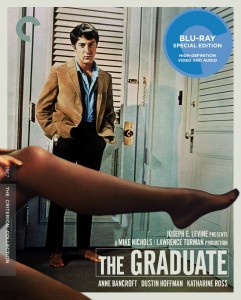 In college not twenty years after its release, I was expected to love The Graduate, and I didn’t. The racy “Mrs. Robinson” sex comedy aspect, which gave the decency boards fits back in 1967 as society and the movies changed, worked, but the technique felt dated, and I was self-satisfied in “killing the father” by not responding to it. At 50, with the movie right behind me, I see it differently. Nominated for seven Oscars, it won solely for director Mike Nichols, who without question brought a fresh eye to the “generation gap” of its era. Except that Nichols wasn’t going for that at all–in interview footage Elaine May used for her recent PBS American Masters installment on her late colleague, and in the close-to-the-end conversation with theatre director Jack O’Brien that is the entirety of HBO’s absorbing Becoming Mike Nichols, the director says that he never once thought of contemporary events. It was, he confirms, a “surreal” take on Benjamin’s attempt to free himself of the weight of material possessions, including his dead-end affair. The famed “plastics” scene is the movie. You may well disagree–which makes the film, a cultural touchstone that seemed to have had its day, more slippery and more enticing. Maybe I’d only thought I’d seen it all.
In college not twenty years after its release, I was expected to love The Graduate, and I didn’t. The racy “Mrs. Robinson” sex comedy aspect, which gave the decency boards fits back in 1967 as society and the movies changed, worked, but the technique felt dated, and I was self-satisfied in “killing the father” by not responding to it. At 50, with the movie right behind me, I see it differently. Nominated for seven Oscars, it won solely for director Mike Nichols, who without question brought a fresh eye to the “generation gap” of its era. Except that Nichols wasn’t going for that at all–in interview footage Elaine May used for her recent PBS American Masters installment on her late colleague, and in the close-to-the-end conversation with theatre director Jack O’Brien that is the entirety of HBO’s absorbing Becoming Mike Nichols, the director says that he never once thought of contemporary events. It was, he confirms, a “surreal” take on Benjamin’s attempt to free himself of the weight of material possessions, including his dead-end affair. The famed “plastics” scene is the movie. You may well disagree–which makes the film, a cultural touchstone that seemed to have had its day, more slippery and more enticing. Maybe I’d only thought I’d seen it all.
The Graduate is a home video perennial, packaged again and again, like the Bond movies. Doing what it does best, the Criterion Collection has married a stunning new transfer (4k remastered image, with much more resonant colors, and a DTS-HD Master Audio 5.1 audio option) with a bevy of extras, including excellent new conversations with Dustin Hoffman, screenwriter Buck Henry, and producer Lawrence Turman, who approached Nichols with the source novel before he made his film directing debut with the completely different Who’s Afraid of Virginia Woolf? (1966). The rest is mostly older gold, drawn from Criterion but also other prior video incarnations. Film scholar Howard Suber’s commentary, from the label’s 1987 laserdisc, is amazingly sharp and specific on almost anything you could think to ask, missing only Nichols’ distinctive way with words–and there it is, in a wonderful feature-length discussion with Steven Soderbergh, from a 2007 release. I’m surprised Criterion didn’t wait till next year for what might have been a 50th anniversary release, but for fans and open-minded skeptics, the party has started early. So much more: Screen tests, Paul Simon on Dick Cavett, a Today Show interview with Nichols and Barbara Walters from 1966, a 25th anniversary featurette, etc. You can spend hours and hours with this Complete Graduate, a master’s course.
 I spent hours and hours with The Emigrants and The New Land, a Criterion packaging of two relatively unsung classics of foreign cinema. Yes, they were Oscar nominees: The Emigrants (1971) for Best Picture, Best Actress (Liv Ullmann), Best Director (Jan Troell), and Best Writing (from acclaimed Swedish novels), The New Land (1972) for Best Foreign-Language Film. But both films, which run more than three hours each, were severely cut down by Warner Brothers for US consumption, and neither has been seen much since what were then the “cultural channels,” A&E and Bravo, aired them in the 90s. Imagine watching them today, followed by an installment of The Real Housewives of Atlanta, depicting a…different kind of American mobility. But do watch them, in what is their proper debut after 45 years.
I spent hours and hours with The Emigrants and The New Land, a Criterion packaging of two relatively unsung classics of foreign cinema. Yes, they were Oscar nominees: The Emigrants (1971) for Best Picture, Best Actress (Liv Ullmann), Best Director (Jan Troell), and Best Writing (from acclaimed Swedish novels), The New Land (1972) for Best Foreign-Language Film. But both films, which run more than three hours each, were severely cut down by Warner Brothers for US consumption, and neither has been seen much since what were then the “cultural channels,” A&E and Bravo, aired them in the 90s. Imagine watching them today, followed by an installment of The Real Housewives of Atlanta, depicting a…different kind of American mobility. But do watch them, in what is their proper debut after 45 years.
Taking a break from Ingmar Bergman movies, Ullmann and Max Von Sydow star, as a mid-19th century couple who, despite misgivings and clashing temperaments, decide to leave their country for ocean and land voyages to a promised farmland in Minnesota. It was a break, but no holiday; the psychological rigors of Bergman’s films are replaced by physical hardships in Troell’s, as the actors struggle, and toil, to survive their terrible travels, problems with the land, and neighbors (including Native Americans) who seem beyond comprehension. An entire lost world of immigrant dreams and dashed hopes opens up before our eyes, and I guarantee you’ll wind up binge-watching them. Six and a half hours beautifully spent, in the company of an epic-worthy restored transfer, topped off by supplements that include new interviews with the director and Ullmann, an hour-long documentary from 2005, and an introduction from film critic John Simon. He seemed to hate everything in his heyday on the job, but loved these two films, and his affection provides a nice gateway into viewing.
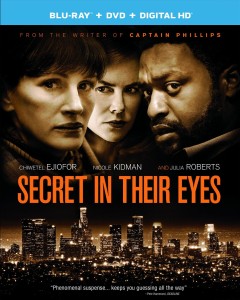 Take two Oscar-winning actresses, Julia Roberts and Nicole Kidman. Add in an Oscar-nominated actor, Chiwetel Ejiofor. Have an Oscar-nominated writer/director, Billy Ray (screenplay nomination, Captain Phillips), adapt an Oscar-winning foreign-language film, Argentina’s The Secret in Their Eyes (2009) for Hollywood-friendly audiences. Stir well and you get–well, not an Oscar-nominated film, one that lost an article in translation, Secret in Their Eyes. It lost a bit more than that, too, but this is one of those “hey, this isn’t so bad” mystery-thrillers, with a topical edge (9/11 is woven in) that will enliven a slow night. The die was cast when Roberts, in a severe, “I mean business” haircut, had Kidman, an infallible flop indicator, take part. Yet neither shirks their duty, with Roberts locked in grief as a DA investigator whose daughter has been killed and Kidman an assistant DA with unusual interrogation skills, in an eventful procedural that unravels after 13 years as Ejiofor uncovers new leads. Credibility is stretched, yet concentration remains reasonably steady, which is no small accomplishment given how lifeless transfers like these can turn out. Roberts does EPK duty for one brief featurette, with Ray and producer Mark Johnson handling a proficient commentary.
Take two Oscar-winning actresses, Julia Roberts and Nicole Kidman. Add in an Oscar-nominated actor, Chiwetel Ejiofor. Have an Oscar-nominated writer/director, Billy Ray (screenplay nomination, Captain Phillips), adapt an Oscar-winning foreign-language film, Argentina’s The Secret in Their Eyes (2009) for Hollywood-friendly audiences. Stir well and you get–well, not an Oscar-nominated film, one that lost an article in translation, Secret in Their Eyes. It lost a bit more than that, too, but this is one of those “hey, this isn’t so bad” mystery-thrillers, with a topical edge (9/11 is woven in) that will enliven a slow night. The die was cast when Roberts, in a severe, “I mean business” haircut, had Kidman, an infallible flop indicator, take part. Yet neither shirks their duty, with Roberts locked in grief as a DA investigator whose daughter has been killed and Kidman an assistant DA with unusual interrogation skills, in an eventful procedural that unravels after 13 years as Ejiofor uncovers new leads. Credibility is stretched, yet concentration remains reasonably steady, which is no small accomplishment given how lifeless transfers like these can turn out. Roberts does EPK duty for one brief featurette, with Ray and producer Mark Johnson handling a proficient commentary.
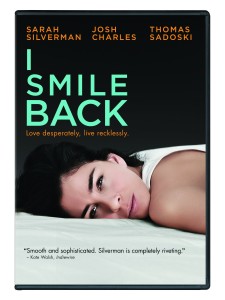 What to do with Sarah Silverman? Like you, I enjoyed a season or two of her Comedy Central show, and, like you, I bailed when it fell off its edge and became too abrasive and cloying to watch. I Smile Back provides an answer, with Silverman picking up the tragedienne cloak worn by Jennifer Aniston in Cake and twirling it madly. Like Benjamin Braddock in The Graduate, she’s beset by material things; unlike Benjamin, she’s middle-aged, tethered to a supportive husband (Josh Charles) and children, and losing her shit to depression, bad behavior, and childhood scars that have never healed. In short, a plum showcase role, and she doesn’t waste the opportunity to emote in a different way than usual, for which she received a SAG nomination. The movie, however, is the sort of tidily produced and plotted American indie that limits her stretching against type. It is a relief to see her cut loose for a moment or two in a supplementary interview segment filmed at last year’s Toronto International Film Festival.
What to do with Sarah Silverman? Like you, I enjoyed a season or two of her Comedy Central show, and, like you, I bailed when it fell off its edge and became too abrasive and cloying to watch. I Smile Back provides an answer, with Silverman picking up the tragedienne cloak worn by Jennifer Aniston in Cake and twirling it madly. Like Benjamin Braddock in The Graduate, she’s beset by material things; unlike Benjamin, she’s middle-aged, tethered to a supportive husband (Josh Charles) and children, and losing her shit to depression, bad behavior, and childhood scars that have never healed. In short, a plum showcase role, and she doesn’t waste the opportunity to emote in a different way than usual, for which she received a SAG nomination. The movie, however, is the sort of tidily produced and plotted American indie that limits her stretching against type. It is a relief to see her cut loose for a moment or two in a supplementary interview segment filmed at last year’s Toronto International Film Festival.
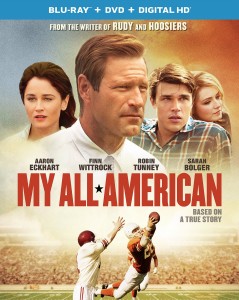 My All-American slipped into my mailbox, unrequested. For the record, it’s a football movie, but no Brian’s Song (1971) as it covers some of the same tear-jerking territory. Angelo Pizzo won hearts with his sporting screenplays for Hoosiers (1986) and Rudy (1993) yet, directing this time, his mind has wandered–there was no need to spend a full two hours on the type of story that the legendary TV movie encapsulated in 75 or so minutes. With Aaron Eckhart as the coach and Big Short co-star Finn Wittrock as the doomed, yet inspiring, player, Freddie Steinmark, whose story is retold in the supplements. February starts with the Super Bowl and ends with the Oscars–in between, there are plenty of movies that never get off the sidelines, like My All-American.
My All-American slipped into my mailbox, unrequested. For the record, it’s a football movie, but no Brian’s Song (1971) as it covers some of the same tear-jerking territory. Angelo Pizzo won hearts with his sporting screenplays for Hoosiers (1986) and Rudy (1993) yet, directing this time, his mind has wandered–there was no need to spend a full two hours on the type of story that the legendary TV movie encapsulated in 75 or so minutes. With Aaron Eckhart as the coach and Big Short co-star Finn Wittrock as the doomed, yet inspiring, player, Freddie Steinmark, whose story is retold in the supplements. February starts with the Super Bowl and ends with the Oscars–in between, there are plenty of movies that never get off the sidelines, like My All-American.





Comments